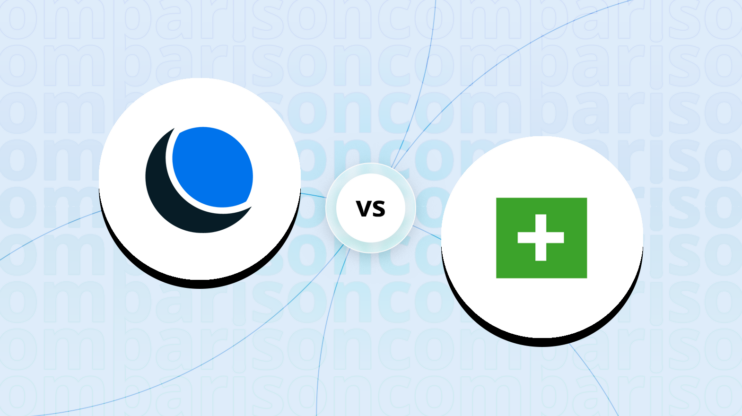Dreamhost vs Domain.com: Final verdict
Looking over DreamHost vs. Domain.com, it’s clear why both hosts are so popular. They have both hosted millions of
websites that run on WordPress for decades, building up a loyal customer base.
Domain.com (Overall grade: 6.5)
is more user-friendly for beginners with its drag-and-drop builder and simplified tiered pricing making it attractive for individuals and small businesses. It offers essential features like unlimited storage and bandwidth, a free domain for the first year, and a range of SSL certificates. Despite these strengths, Domain.com falls short in areas such as overall performance, with uptime and response times lagging behind DreamHost. The lack of advanced hosting options like VPS or cloud hosting and limited automation in site migrations also contribute to its lower appeal for more tech-savvy users or businesses with complex needs.
DreamHost (Overall grade: 8.2)
boasts a variety of hosting options including shared, cloud, WordPress, VPS, and dedicated hosting, making it highly versatile for a wide range of user needs. Its strength lies in exceptional performance, with a 100% uptime guarantee and fast response times backed by advanced infrastructure like SSD storage and NGINX hosting. DreamHost also offers a user-friendly control panel, comprehensive email services, and advanced security features. However, the absence of direct phone support is a noted downside, although the extensive 24/7 support through live chat and email compensates for this limitation.
 Overall grade:8.2 |
 Overall grade:6.5 |
|
|---|---|---|
| Uptime and Availability | 8.5 | 3.2 |
| Hosting Performance | 7.8 | 5.3 |
| Hosting Security | 7.8 | 7.9 |
| Price | 8.2 | 8.1 |
| Hosting Features | 7.9 | 5.8 |
| Ease Of Setup | 8.9 | 7.7 |
| User Management | 8.1 | 7.2 |
| Customer Support | 8.3 | 7.1 |
| User feedback | 4/5 | 3.2/5 |
Hosting types offered
Both platforms provide a variety of hosting types, each designed to meet the different needs of users.
 |
 |
|
|---|---|---|
| Shared hosting | ||
| Cloud hosting | ||
| WordPress hosting | ||
| Ecommerce hosting | ||
| VPS hosting | ||
| Dedicated hosting |
Although both offer a variety of hosting plans tailored to different needs, in
certain cases, one platform may prove to be more suitable.
Detailed comparison
Uptime and availability
Evaluates the average uptime statistics, uptime guarantee and overall availability of the hosting
provider
Score Components:
- Uptime percentage (30%): evaluates the uptime statistics in given period of time
- Uptime guarantee (20%): Assesses if the platform offers an uptime guarantee and
whether the actual uptime matches the promised guarantee. - General performance (25%): Evaluates how fast is the average response time and overall
it’s stability. - Responsiveness (10%): Adaptability to different devices and screen sizes.
- Availability (25%): Reflects the total downtime and number of outages.
 8.5
8.5
 3.2
3.2
🏆 Winner DreamHost: DreamHost provides excellent uptime and fast response times.

DreamHost leads with a 100% uptime guarantee, translating to no downtime issues for users. The hosting provider recorded 100% uptime in multiple tests and averaged response times from 231ms to 342ms, showing consistent performance. It handled stress tests well, managing substantial user loads with minimal fluctuations.

Domain.com offers a 99.99% uptime guarantee, yet actual performance lags with uptimes of 98-99.11%. The response times were notably slower, clocking in at 1.591 to 2.97 seconds. This inconsistency in uptime and slower speeds make Domain.com less competitive compared to DreamHost.
Which one has better hosting performance?
Score Components:
- Hosting speed (30%): This includes SSD quality, Load times, PageSpeed score ranges,
additional information on website speed, built-in plugins for performance enhancement, available caching
methods, and CPU/RAM options - CDN (20%): Considers whether CDN is available or not, whether it’s free or paid, and
the quality of the CDN service - Available data centers (30%): Evaluates the number of data centers and their locations
globally. - Scalibility (20%): Looks at whether elastic scaling is available, the process required
to scale (manual upgrade vs. automatic scaling), the presence of dedicated servers, and the costs
associated with scaling.
 7.8
7.8
 5.3
5.3
🏆 Winner DreamHost: Best performance and feature-rich hosting.
DreamHost and Domain.com differ significantly in general performance. DreamHost stands out with its SSD storage, proven to be 200% better in performance than traditional hard drives. DreamHost uses NGINX hosting and server-level caching, optimizing website speed without extra plugins. On the other hand, Domain.com offers unlimited bandwidth and a 99% uptime guarantee but falls short with its basic hardware features like standard web storage. DreamHost’s multiple datacenter locations provide a robust infrastructure, while Domain.com’s data centers focus more on fundamental support and uptime promises. Both hosts offer SSD, but DreamHost surpasses with more advanced performance measures and reliability-backed structures.
Website Speed
Website speed on DreamHost benefits from multiple features like server-level caching, dedicated resources, and NGINX hosting. These elements contribute to fast load times and efficient handling of concurrent connections. DreamHost’s use of SSD and automatic updates ensures consistent speed and performance. Domain.com, though offering drag-and-drop builders and limited SSD use, relies on basic caching and doesn’t match DreamHost’s advanced mechanisms. Thus, DreamHost ensures faster website load times and consistent performance metrics.
Scalability
Scale options with DreamHost are versatile and user-friendly. With expandable RAM and storage, users can easily upgrade their resources as needed. DreamHost offers VPS and dedicated hosting plans starting at $10.00/mo and $199.00/mo respectively, facilitating seamless transitions as traffic grows. While Domain.com covers basic scaling needs with tiered plans, it lacks the dynamic scalability that DreamHost provides through its robust resource allocation and on-demand upgrades. DreamHost’s approach ensures better scalability for growing websites and applications.
Which one has better security features?
and regulatory requirements
Score Components:
- Technical security measures (40%): This includes encryption, firewalls, DDoS
protection, secure configurations, server monitoring, access control and availability of security addons
(e.g Sitelock security). - Operational security measures (30%): Encompasses data privacy, backups and data
redundancy. - Compliance and certifications (20%): Adherence to legal and regulatory requirements
(e.g., GDPR, HIPAA) and possession of certifications (e.g., ISO 27001, SOC 2). - Business and reliability (10%): Factors in the provider’s reputation, uptime
guarantees, and customer support.
 7.8
7.8
 7.9
7.9
🏆 Winner
Domain.com: Offers advanced security features like various SSL certificates, SiteLock for malware protection, and domain privacy.
Both DreamHost and Domain.com, have notable differences in their approaches to technical and operational
security, as well as in their compliance with regulations.
Technical security measures:
DreamHost provides free SSL certificates through Let’s Encrypt, while Domain.com offers a range of SSL certificates with varying warranties and a free SSL certificate for the first year with certain hosting plans. Both DreamHost and Domain.com offer DDoS protection, but Domain.com’s SiteLock security also includes malware protection and automatic removal, which is an added layer of security not explicitly present in DreamHost. DreamHost supports current PHP versions including PHP 8 with OPcache, but Domain.com’s specific PHP support details aren’t mentioned.
Operational security measures:
DreamHost includes features like Multi-Factor Authentication (MFA), DreamShield malware scanning, and mod_security for added protection. They also provide secure access like SSH and SFTP. Domain.com, on the other hand, includes features such as a Web Application Firewall and database scanning in higher-tier plans, along with 24/7 security expert support. Domain privacy is a key feature of Domain.com, which shields private information from the WHOIS directory.
Compliance and certifications:
Both DreamHost and Domain.com comply with GDPR regulations, ensuring the protection of personal data for EU residents. DreamHost goes a step further by offering a Privacy Center for managing personal information. Domain.com ensures that the personal data of EU residents is not published in the WHOIS database. Neither provider supports HIPAA compliance. For PCI compliance, DreamHost ensures its servers support it but leaves it to the customers to obtain certification, while Domain.com includes PCI compliance scanning in its SiteLock security.
 |
 |
|
|---|---|---|
SSL certificate |
Free via Let’s Encrypt |
Various levels with warranties-free for the first year |
Additional security features |
DreamShield, MFA, mod_security |
SiteLock security, Web Application Firewall, domain privacy |
PHP versions |
Supports PHP 8, OPcache |
Not specified |
GDPR compliance |
Yes |
Yes |
HIPAA compliance |
No |
Not specified |
PCI compliance |
Server support but customer responsible |
PCI compliance scanning included |
Hosting features
Score Components:
- Domains (20%): Assesses the availability of a free domain, domain purchase options, and
pricing - Email (15%): Considers if the provider offers full email hosting, or is reselling
third-party service, and if the email is only transactional or not - Website builder (15%): Checks if website builder is available, and it’s user
friendliness and overall the level of customization allowed. - Staging environment (20%): Determines if a staging environment is available, allowing
for testing changes before going live. - FTP & SFTP accounts (10%): Evaluates if and how easily users can access FTP and
SFTP accounts - Git and SSH access (20%): Assess whether Git is integrated into the hosting service and
if SSH access is provided
 7.9
7.9
 5.8
5.8
🏆 Winner
🏆 Winner
DreamHost: The platform edges out as the winner due to its provision of a free domain for the first year.
DreamHost and Domain.com both offer robust features catering to various business needs. DreamHost provides several hosting options, from shared hosting as low as $2.59 per month to premium dedicated hosting at $199 per month. It includes essential features like unlimited storage, free domain registration, and privacy protection. DreamHost also shines with advanced offerings in its managed WordPress hosting, ensuring high performance with built-in caching, automated backups, and free SSL certificates. For users needing VPS and dedicated servers, DreamHost offers manageable settings, customizable control panels, and round-the-clock support, delivering a high value for tech-savvy professionals.
Domain.com, on the other hand, rents its hosting services with a more consumer-friendly touch. They provide unlimited storage and bandwidth on all plans and offer a free domain for the first year with their promo code. Their drag-and-drop builder makes setting up a website simple, suitable for beginners. While Domain.com lacks some of the advanced features such as staging environments and automatic backups, it compensates with its easy-to-use interface and scalable bandwidth. They have comprehensive support and customizable shared hosting, making it appealing to small businesses and individuals looking for affordability and straightforward solutions.
 |
 |
|
|---|---|---|
Free domain |
Yes |
Yes, for the first year |
Free SSL |
Yes |
Yes, for the first year |
Email hosting |
Yes |
Not specified |
Website builder |
No |
Yes, drag-and-drop builder |
Staging environment |
Yes, 1-click staging |
No |
FTP & SFTP account |
Yes |
Yes |
Git and SSH access |
Yes |
No |
Free backup |
Yes |
No |
Money back guarantee |
Yes |
Not specified |
a location.
As a result in rare cases the features mentioned here can differ from the ones you see on their websites.
Both providers support a range of users from beginners to experts with user-friendly website builders and WordPress staging areas. However, in terms of developer tools, both DreamHost and Domain.com offer robust options including SSH access, support for multiple programming languages, and Git for version control, thus appealing to developers looking for advanced capabilities.
Email services:
DreamHost offers comprehensive professional email services, including unlimited email accounts with their plans. They support transactional emails and allow users to set up email campaigns, integrating smoothly with marketing tools. Domain.com does not specify their email hosting capabilities extensively but provides the necessary transactional email abilities and resells third-party services. This makes DreamHost a more appealing choice for users who prioritize versatile and robust email hosting options.
Price
Score Components:
- Plan value (40%): What each pricing tier offers.
- Transparency and clarity (30%): Clearness of pricing structures.
- Flexibility of plans (20%): Range of options to suit different budgets.
- Hidden costs (10%): Additional expenses not included in the plan.
 8.2
8.2
 8.1
8.1
🏆 Winner
DreamHost: Offers a broad range of hosting plans with impressive features, making it a versatile choice for many users.
Evaluating the pricing of plans among various hosting providers can be complex due to their differing pricing and renewal strategies. Additionally, certain plans require annual commitments, which adds to the difficulty of making comparisons. The prices listed are based on monthly commitments; plans requiring annual commitments are indicated. Additionally, although some providers offer identical plans for WordPress and shared hosting, we have created separate tables for each to enhance clarity.
When comparing DreamHost and Domain.com, DreamHost offers comprehensive features across a variety of hosting plans, including shared hosting, managed WordPress hosting, VPS, dedicated servers, and cloud computing. DreamHost’s plans range in price from as low as $2.59/month for the Shared Starter plan to $299.00/month for Enhanced 32 dedicated hosting. In contrast, Domain.com offers more simplified pricing with all plans ranging at $3.75/month, which includes basic features like unmetered bandwidth and a free domain for the first year. While DreamHost scores higher overall, offering plans with extensive storage, automated backups, and specialized support, Domain.com remains a cost-effective option for basic hosting needs with consistent pricing and essential features.
 |
 |
|---|---|
|
DreamPress ($19.99)
One website, 30GB SSD storage, unmetered bandwidth, specialized support, free domain, automated & on-demand backups. Value for price:8.5
|
Basic Plan ($3.75)
One website, 10GB storage, unmetered bandwidth, free SSL and domain (first year), 5 FTP accounts. Value for price:7.5
|
|
DreamPress Plus ($34.99)
One website, 60GB SSD storage, unmetered bandwidth, specialized support, free domain, automated & on-demand backups. Value for price:8.7
|
Plus Plan ($3.75)
Five websites, 20GB storage, unmetered bandwidth, free SSL and domain (first year), 10 FTP accounts. Value for price:7.8
|
|
DreamPress Pro ($89.99)
One website, 120GB SSD storage, unmetered bandwidth, specialized 24/7 support, free domain, automated & on-demand backups, priority support. Value for price:7.9
|
Premium Plan ($3.75)
Ten websites, 40GB storage, unmetered bandwidth, free SSL and domain (first year), 15 FTP accounts. Value for price:8.0
|
 |
 |
|---|---|
|
Shared Starter ($5.99)
One website, unlimited storage, unlimited bandwidth, free SSL and domain, automated daily backups, 24/7 support. Value for price:8.2
|
Basic Plan ($3.75)
One website, 10GB storage, unmetered bandwidth, free SSL and domain (first year), 25 FTP accounts. Value for price:6.8
|
|
Shared Unlimited ($10.99)
Unlimited websites, unlimited storage, unlimited bandwidth, free SSL and domain, automated daily backups, email hosting, 24/7 support. Value for price:8.4
|
Plus Plan ($3.75)
Five websites, 20GB storage, unmetered bandwidth, free SSL and domain (first year), 50 FTP accounts. Value for price:7.0
|
|
N/A
|
Premium Plan ($3.75)
Ten websites, 40GB storage, unlimited bandwidth, free SSL and domain (first year), unlimited FTP accounts. Value for price:7.3
|
 |
 |
|---|---|
|
DreamCompute ($10.00/month)
Scalable cloud computing, SSD storage, unmetered bandwidth, full root access, OpenStack APIs, 24/7 support. Value for price:8.1
|
N/A
|
|
DreamObjects (Varies)
Cloud storage, Amazon S3 compatibility, SSD storage, unlimited subdomains, 24/7 support. Value for price:7.8
|
N/A
|
As a result in rare cases the prices displayed here can differ from the ones you see on their websites.
Enterprise plans
DreamHost offers dedicated hosting plans like the Enhanced 32 at $299.00/month with features including 32GB RAM and 480GB SSD storage along with uncapped bandwidth and a 100% uptime guarantee, perfect for enterprises needing robust resources. In contrast, Domain.com doesn’t provide detailed enterprise-tier plans but offers flexible SSL certificates and SiteLock cybersecurity plans around $3.75/month, which might appeal to mid-sized businesses looking for security enhancements.
Dreamhost vs Domain.com: Ease of setup
platform.
Score Components:
- Site migration (25%): Assesses whether the provider offers tools for site migration,
either automated or manual, and whether these services are free or require a fee. - Admin panel usability (35%): Evaluates the type of admin panel provided, such as the
standard cPanel or a custom solution, focusing on its accessibility and user-friendliness for both
technical and non-technical users. - Setup features (20%): Examines the availability and ease of use of various setup
features, including FTP accounts, file managers, email account setup, PHPMyAdmin, and easy CDN
configuration. - Help center quality (20%): Measures the quality and accessibility of the provider’s
help center resources, including articles and tutorials.
 8.9
8.9
 7.7
7.7
🏆 Winner DreamHost: DreamHost provides streamlined setup and comprehensive support for hassle-free website hosting.
DreamHost uses a custom-built control panel designed to enhance ease of use for both beginners and advanced users. The control panel includes features like SFTP, Shell Access, and WP-CLI, which are presented in an easy-to-navigate interface. For those less technically inclined, the panel provides straightforward options to manage domains, email, and automatic backups. Its user-focused design reduces the learning curve and helps streamline administrative tasks.
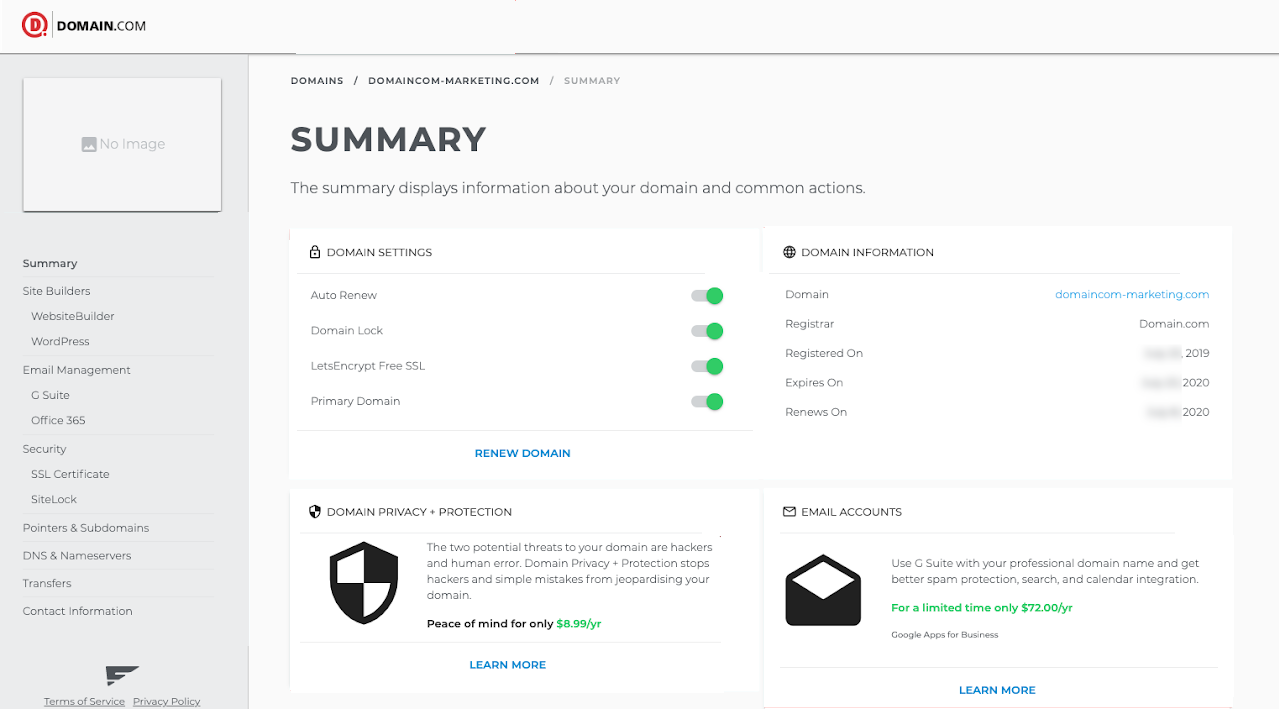
In comparison, Domain.com utilizes a standard control panel with added ease through its integration of an AI-powered website builder. This AI tool simplifies setup, allowing users to build a site quickly with minimal input. The drag-and-drop feature of the website builder further contributes to the user-friendliness, especially for those less familiar with web design. Both hosting providers offer simplified interfaces, but DreamHost’s custom control panel is particularly geared towards more technical website management capabilities.
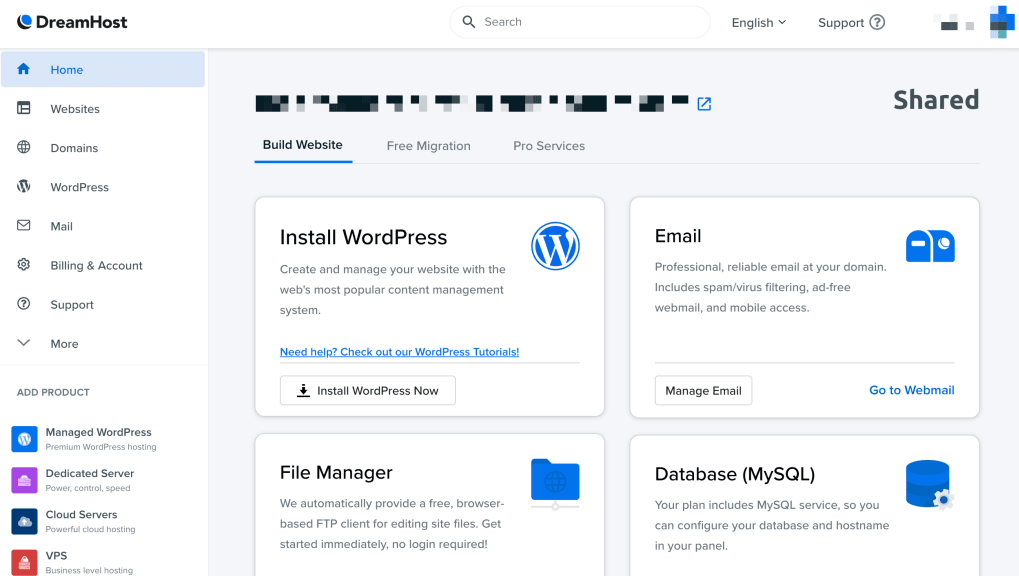
DreamHost offers a thorough Migration Dashboard that automates site transfer, providing a guided process for users to easily move their sites. This service is free of charge and includes checking and confirming site functionality post-migration. Conversely, information on Domain.com’s migration tools is limited, but their support team offers live chat assistance for any migration questions, implying that while tools may be less automated, support is available to guide users through the process.
Both hosts provide significant support, but DreamHost stands out for its depth of resources and accessible expert assistance.
User management
accessibility.
Score Components:
- Role customization (40%): Flexibility in creating and defining user roles and
permissions. - Ease of management (30%): User interface and tools for managing users.
- Access control (20%): Effectiveness of access control measures for different user
levels. - Scalability (10%): Ability to manage a growing number of users efficiently.
 8.1
8.1
 7.2
7.2
🏆 Winner: DreamHost: Offers extensive user management features and flexibility.
DreamHost and Domain.com both provide user management capabilities, but their approaches differ significantly. DreamHost stands out with its unlimited SFTP users, secure SSH access, and advanced tools for user access and command-line operations. Domain.com mainly focuses on WordPress user roles, offering a predefined set of roles such as Administrator, Editor, Author, Contributor, and Subscriber. While DreamHost’s flexible SFTP users and crontab access cater to both novice and advanced users, Domain.com’s tiered roles simplify content management but are less versatile for server access and broader user management.
DreamHost’s control panel is custom-built and integrates various user management tools like domains, email accounts, and file management, all in one place. This streamlined interface makes it convenient to manage multiple aspects without switching platforms. On the other hand, Domain.com relies on the familiar WordPress dashboard for user management, which may appeal to users comfortable with WordPress but lacks the comprehensive tools offered by DreamHost’s panel.
Access control measures in DreamHost are more advanced, featuring SSH, SFTP, and password-protected directories to ensure robust security. DreamHost also provides access to raw log files, aiding in performance analysis and troubleshooting. Domain.com’s WordPress-centric approach is simpler but less suitable for complex access control needs. Managing a larger number of users may become cumbersome on Domain.com due to its limited roles compared to DreamHost’s flexible access options and advanced job scheduling with Cron.
DreamHost User Roles Table:
| Role | Description | Access Highlights |
|---|---|---|
| Unlimited SFTP Users | Grant access to multiple users via secure SFTP. | Secure file transfers, role-based access controls. |
| SSH Access | Provides secure remote server access. | Command-line operations, advanced server management. |
| Custom Control Panel | Centralized management of domains, emails, and more. | Intuitive panel for managing multiple hosting aspects efficiently. |
| Crontab Access | Schedule time-based jobs. | Automate command-line tasks, ideal for routine maintenance. |
| Email Accounts | Professional email services with substantial features. | 25GB storage, ad-free webmail, robust spam, and virus protection. |
| Password Protection | Restrict directory access with password protection. | Secure sensitive content with .htaccess. |
| Raw Log Files | Access site log files for in-depth analysis. | Performance analysis, troubleshooting without affecting load times. |
Customer support
hosting provider.
Score Components:
- Support communication channels (30%): Measures the variety of customer support types
provided (live chat, chatbot, email, phone, etc.) - Availability (20%): Assesses the availability hours for each channel, including 24/7
support options. - Technical support quality (30%): Assesses whether the provider offers comprehensive
technical support, including hardware upgrades (e.g., HDD to SSD), software installations, and web
server configuration changes. - Enterprise support (20%): Checks if there are dedicated or priority support services
for enterprise-level customers.
 8.3
8.3
 7.1
7.1
🏆 Winner DreamHost: Provides superior support availability and options compared to Domain.com.
 |
 |
|
|---|---|---|
Phone support |
||
Live chat support |
||
Chatbot |
||
Email/ticket support |
||
Enterprise support (dedicated agent, priority support) |
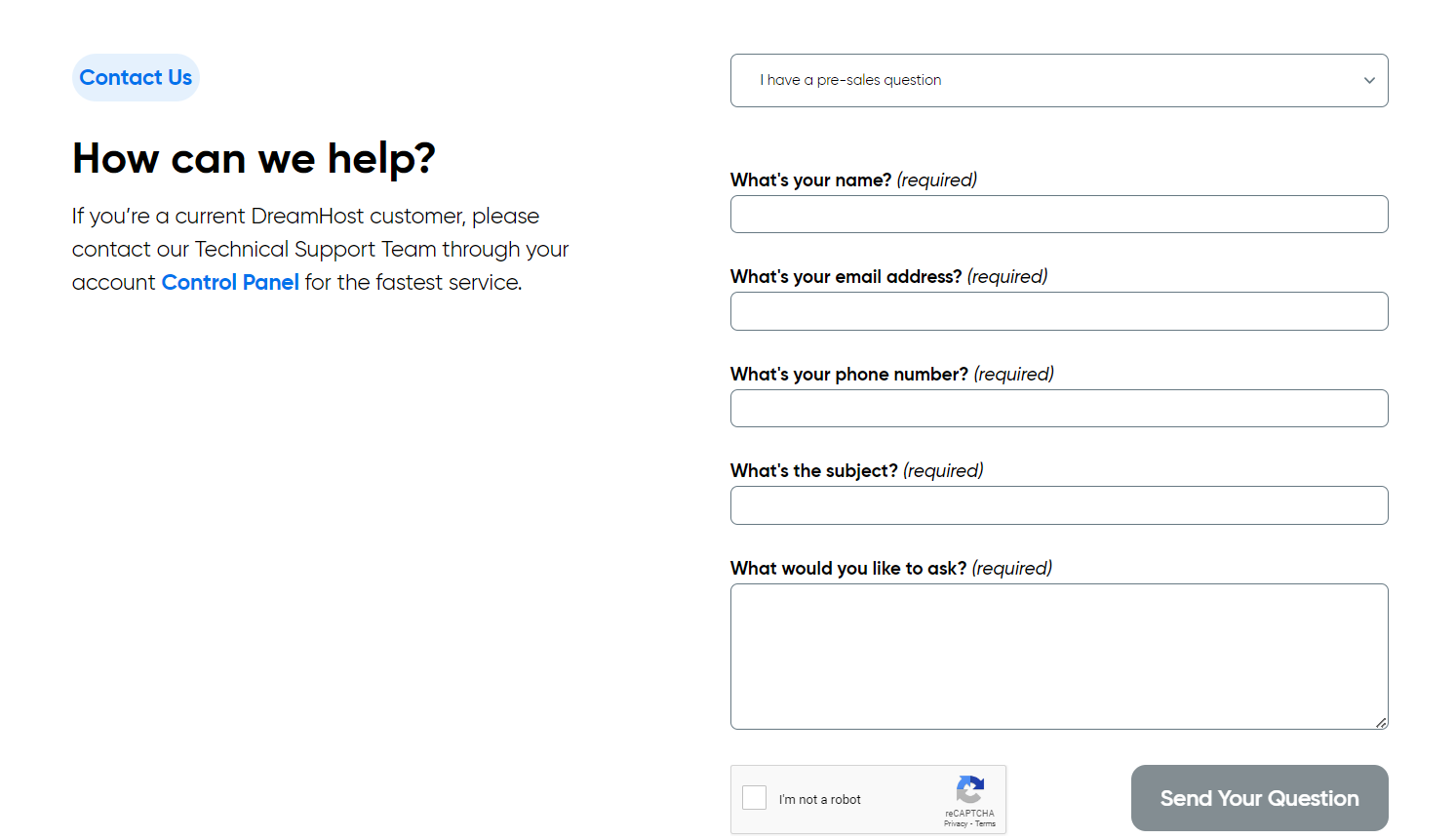
When comparing customer support options between DreamHost and Domain.com, DreamHost stands out with its extensive 24/7 support availability. DreamHost offers a versatile range of communication channels including live chat, email, and a ticket system, all accessible around the clock through their panel. Though they lack direct phone support, users can request a callback for an additional fee. DreamHost supports two languages, English and Spanish, and ensures quick response times for both live chat and ticket inquiries. Their comprehensive knowledge base also offers valuable tutorials and troubleshooting articles, although discussion forums ended in 2022.
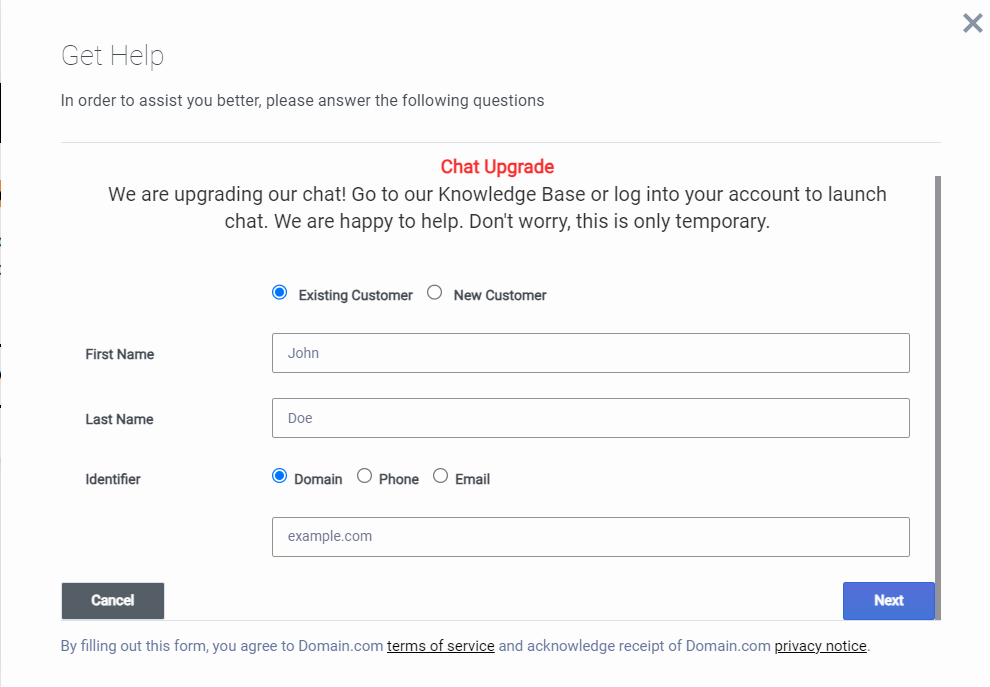
On the other hand, Domain.com provides 24/7 support through phone and live chat, with commendably fast connection times. While they lack explicit email support, their web chat requires users to submit an email address, indicating indirect email communication. Domain.com boasts a practical knowledge base featuring step-by-step guides and video tutorials, yet customer feedback highlights some issues with responsiveness and problem resolution. Despite this, their uptime guarantee and flexible refund policy remain practical advantages. Nonetheless, with a higher overall score, DreamHost emerges as the favored choice in this comparison.
Dreamhost vs Domain.com: User feedback
DreamHost is a well-regarded hosting provider praised for its reliability, affordable pricing, user-friendly interface, and excellent performance. Users especially appreciate the responsive customer support, the easy navigation of the web portal, and a variety of hosting options suitable for different needs. However, common criticisms include the lack of phone support, occasional slow response times from customer service, and some challenges related to advanced functionalities and site migrations. While the majority of users report positive experiences, a few have faced significant issues with downtime and customer service, impacting their overall satisfaction.
User feedback for this hosting provider reveals a mixed experience. Many users appreciate its user-friendly platform, straightforward domain registration process, and reliable customer support. However, significant criticisms include poor customer service practices, confusing pricing and add-ons, and outdated or slow web interfaces. While some users praise the affordability and efficiency of domain management, others warn of hidden costs and problematic service.
Dreamhost vs Domain.com: FAQ
Which platform is better suited for hosting WordPress websites?
DreamHost is better suited for hosting WordPress websites, offering specialized WordPress plans like DreamPress with automatic updates, enhanced security, and robust performance tuning. Domain.com also supports WordPress hosting, but it lacks some advanced features and optimizations that DreamHost provides.
Are both platforms suitable for beginners?
Both DreamHost and Domain.com are suitable for beginners, but they cater differently. Domain.com offers a drag-and-drop builder and simplified tiered pricing that appeals to individuals and small businesses. DreamHost, while providing a user-friendly control panel, may be more versatile for those looking to expand their technical understanding.
Which hosting service offers more scalability options for growing websites?
DreamHost offers more scalability options with its expandable RAM, storage, VPS, and dedicated hosting plans. This allows users to easily upgrade resources as needed. Domain.com covers basic scaling needs with tiered plans but lacks the dynamic and versatile scalability provided by DreamHost.
Which platform offers better customer support?
DreamHost provides extensive 24/7 support through live chat and email with a ticket system, but does not offer direct phone support. In contrast, Domain.com offers 24/7 phone and live chat support but has received mixed reviews regarding responsiveness and problem resolution. Overall, DreamHost’s support is generally considered more comprehensive.
What are the major differences in pricing and value between DreamHost and Domain.com?
DreamHost offers a range of hosting plans from as low as $2.59/month for shared hosting to $299.00/month for dedicated hosting, with extensive features like automated backups and SSD storage. Domain.com simplifies pricing at around $3.75/month across plans, providing basic features like unmetered bandwidth and a free domain for the first year. DreamHost provides higher value for more advanced needs, while Domain.com remains a cost-effective option for basic hosting needs.
The making of this blog
We followed a clear, step-by-step process to write and research this article.









